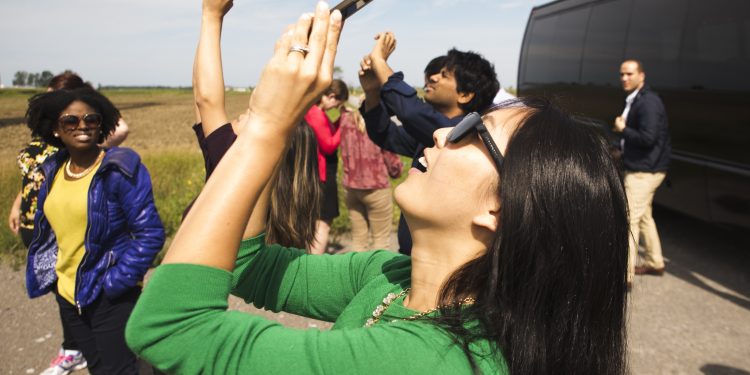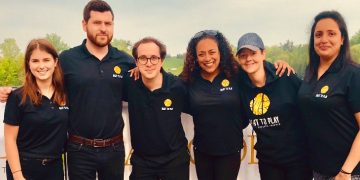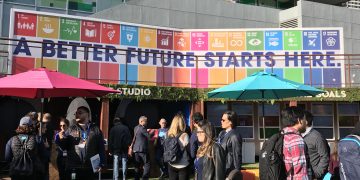Lindsay Colley: Living a Social Impact life

Tim Hortons’ former manager of sustainability, Lindsay Colley, now Director of Thought Leadership at Canada’s audit regulator. As a masters teacher in corporate social responsibility, she shares tips for sustainability professionals on their first day of work and provides insights for the future of the industry. She also talks with us about how we can all live a social impact life- sharing how she combines impact into her career and how you can too.
Tell us about your job. What do you do?
I am the Director of Thought Leadership at the Canadian Public Accountability Board (CPAB), Canada’s audit regulator. I think about the future of audit, and develop and share innovative insights about audit with companies, investors, committees and audit firms.
Alongside my day job, I teach a Masters-level corporate social responsibility course at the Schulich School of Business, I am the Vice-Chair of the Toronto Public Library Board and a member of the Social Issues Committee of the Salvation Army Canada & Bermuda Territory.
I was also selected to participate in a year-long fellowship program called Your Energy Future which is a partnership between Action Canada and the Public Policy Forum. The program is a national policy engagement and leadership development initiative focused on Canada’s energy policy.
How did you get your current job and how did your previous work / life experience prepare you for a career in social impact?
I definitely haven’t had a conventional career path. Like many, I have struggled with marrying what I am good at with what I care about.
“Clearly, I am not a traditional accountant… the training that I received in my early career has provided me with skills that I have found to be extremely useful in terms of making social impact.”
I started my career at Ernst & Young LLP (EY), where I earned my CPA, CA credentials. Approximately four years in, I decided to change careers. I obtained a Certificate in Environmental Management from the University of Toronto and transferred to EY’s Climate Change and Sustainability Services group as a consultant. From there, I moved to Tim Hortons to be their Manager, Sustainability and in 2013 was approached by CPAB to join their fledgling Thought Leadership team.
Clearly, I am not a traditional accountant. However, the training that I received early in my career provided me with skills that I have found to be extremely useful in terms of making a social impact. In particular, I have found my analytical abilities, strategic-mindset and project management skills to be of great use to public, nonprofit and social impact organizations. Conversely, my broader understanding of the world, bigger picture thinking and innovation orientation have been identified as some of my strengths in my current role.
What motivates you?
This is going to sound a little cheesy, but what motivates me is a very idealistic belief that we are obligated to achieve the most good that we can, given our circumstances and our abilities. This belief also reaches to the organizational level, which is why I very strongly advocate for corporate social responsibility. Private corporations have a huge impact on societal well-being and are a critical piece in the global move to a more sustainable future.
This is why I love teaching corporate social responsibility. It’s my hope that today’s business students are tomorrow’s business leaders – leaders who understand the greater role business plays in society and who truly embrace the notion of sustainable development.
What advice would you give someone on their first day of work as a sustainability professional?
“…have an elevator pitch to justify both your role and how sustainability is good for the company.”
Make sure you have an elevator pitch to justify both your role and how sustainability is good for the company. More specifically, ensure you directly refute the most common arguments against corporate social responsibility (“it’s just a marketing exercise!”). A huge part of your job will be working to change corporate culture, so having a strong elevator pitch will go a long way.
When I was at Tim Hortons, I used to say “99% of the employees here are working to ensure that Tim Hortons is still around 3-5 years from now. I’m working to ensure that Tim Hortons is still around 50 years from now.”
What advice do you have for people looking for social impact jobs?
I would tell them to stop looking for social impact jobs. Instead, I’d encourage them to try to maximize the social impact of their entire life. Yes, your job is a big part of life, but it is no means the only part, nor is it necessarily the most impactful way you can make a difference. I would also encourage them to not get discouraged. I know the social impact career space has low supply and huge demand. Remember that having a social impact job does not guarantee that you will make greater impact than having a conventional job. There are many ways to have a positive impact on society and I think I’m a good example of that. Find ways to apply your skills to social problems – sit on a Board, volunteer and participate in programs like Your Energy Future.
Finally, I encourage those who are interested in social impact to get involved in public policy – particularly if you are an underrepresented demographic (like youth!). Government policy will be a large driver in our transition to a sustainable future. It is an exciting time to get involved, share your ideas, and provide input.
How do you imagine jobs in your industry or social impact in general will change in the next 10 years?
I think the notion of social impact jobs will be diminished over the next 10 years. All sustainability professionals say this, and it is true – we actively work to be unemployed. It is the industry’s hope that this longer-term, more holistic way of thinking becomes embedded into everyday culture so that it is no longer its own discipline. Based on the students that I have taught over the years, I think this may very well become reality – and I’m glad for it!
As part of Your Energy Future, we were asked “What must Canada do as a country to prepare our industries, our communities and our people for the future of global energy policy?” In March 2018, our cohort will be presenting our energy policy recommendations to the federal government.
Do you agree with Lindsay? Let us know in the comments below.




1 Comment
Great interview! Thanks for sharing.